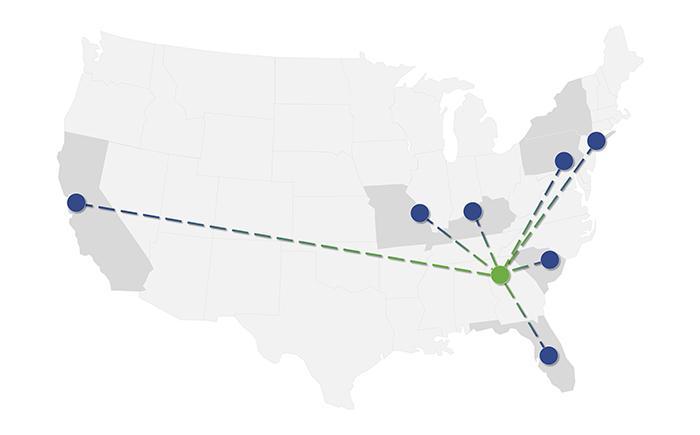Smoke-free Public Housing: Helping Smokers Quit
The American Cancer Society, North American Quitline Consortium, and Smoking Cessation Leadership Center at UCSF worked with community health centers (CHCs), public housing agencies (PHAs), and state health departments/quitlines on a program in 6 communities: one each in California, Florida, Kentucky, Missouri, New York, Pennsylvania, and South Carolina. This project is generously funded by the Robert Wood Johnson Foundation and sought to improve inter-sector coordination for tobacco cessation services for residents of public housing. The project kicked off in early 2019 and continued through spring 2020.
In July 2018, the U.S. Department of Housing and Urban Development (HUD) implemented a smoke-free rule in all federally funded public housing communities. To help compliance with the smoke-free rule, we believe that public housing residents must have full access to a range of cross-sector cessation services from front-line healthcare providers, public housing staff, and quitlines to increase successful quit attempts. These sectors must provide well-coordinated and comprehensive cessation services to maximize the public health benefits of the smoke-free rule for public housing residents, who suffer from a higher burden of many chronic diseases, including behavioral health conditions.
This initiative sought to increase the demand for cessation services among PHA residents to reduce tobacco use and improve the overall health, well-being, and equity of PHA communities. We took a two-tier approach:
- Local collaboration among sectors in each community ensure public housing residents (and all other patients at their health center) know about and can access evidence-based tobacco cessation services, and
- Smoke-free Public Housing virtual learning collaboratives (Project ECHO sessions), an all-teach, all-learn environment that took place every 2 weeks featuring an instructive presentation by a subject matter expert; individual or systems case presentation, followed by expert recommendations and all-participant best practice sharing; and community collaborative action plan update.
For more information, contact Jessica Safier at 1-877-509-3786.


What We’ve Learned
Over the course of this project, the CHCs, PHAs, and quitlines worked both internally and together to better coordinate resources and processes for residents of public housing to access tobacco cessation services. Both systems change and quality improvement with organizational protocols contributed to our lessons learned.
Final ENewsletter #7: The Results
Case Studies: Louisville, KY; San Francisco, CA; Florence, SC
Best Practices/FAQs for CHCs, PHAs, quitlines, and individuals
Smoke-free Public Housing: Helping Residents Quit Tobacco, webinar hosted by SCLC, ACS, and NAQC
Archives

Assistance
Technical Assistance
Additional technical assistance through accredited webinars, online resources, and a toll-free technical assistance line (1-877- 509-3786) will be available to the public at no cost. Sign up to keep informed at 100 Pioneers Listserv.
For questions or comments please email [email protected].

Videos
View instructive and case presentations for each ECHO session as expert faculty and project participants create and share best practices to help patients and make cessation-related systems more efficient.

